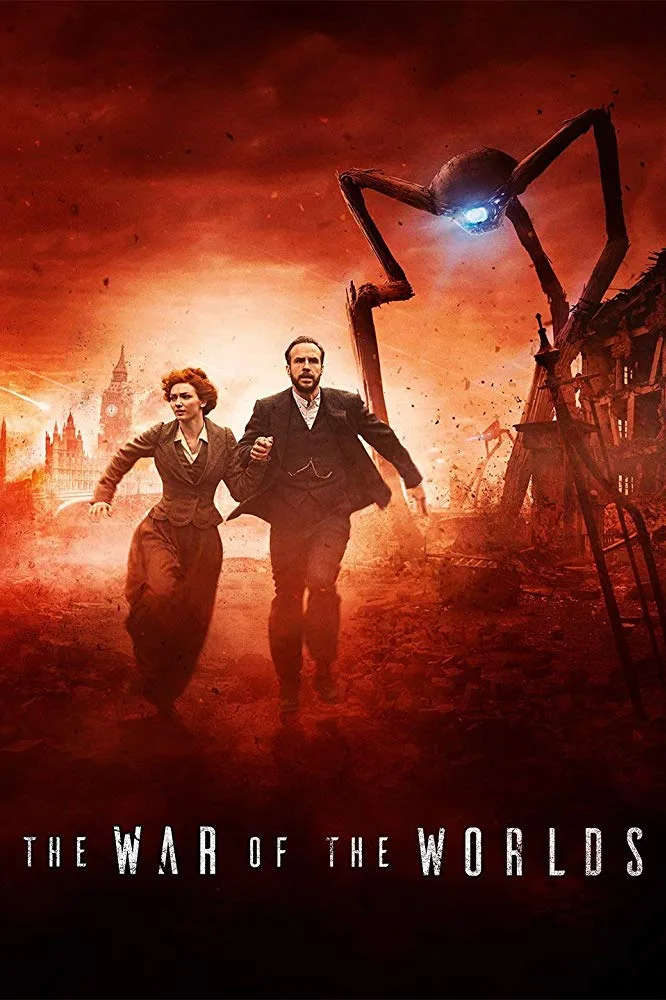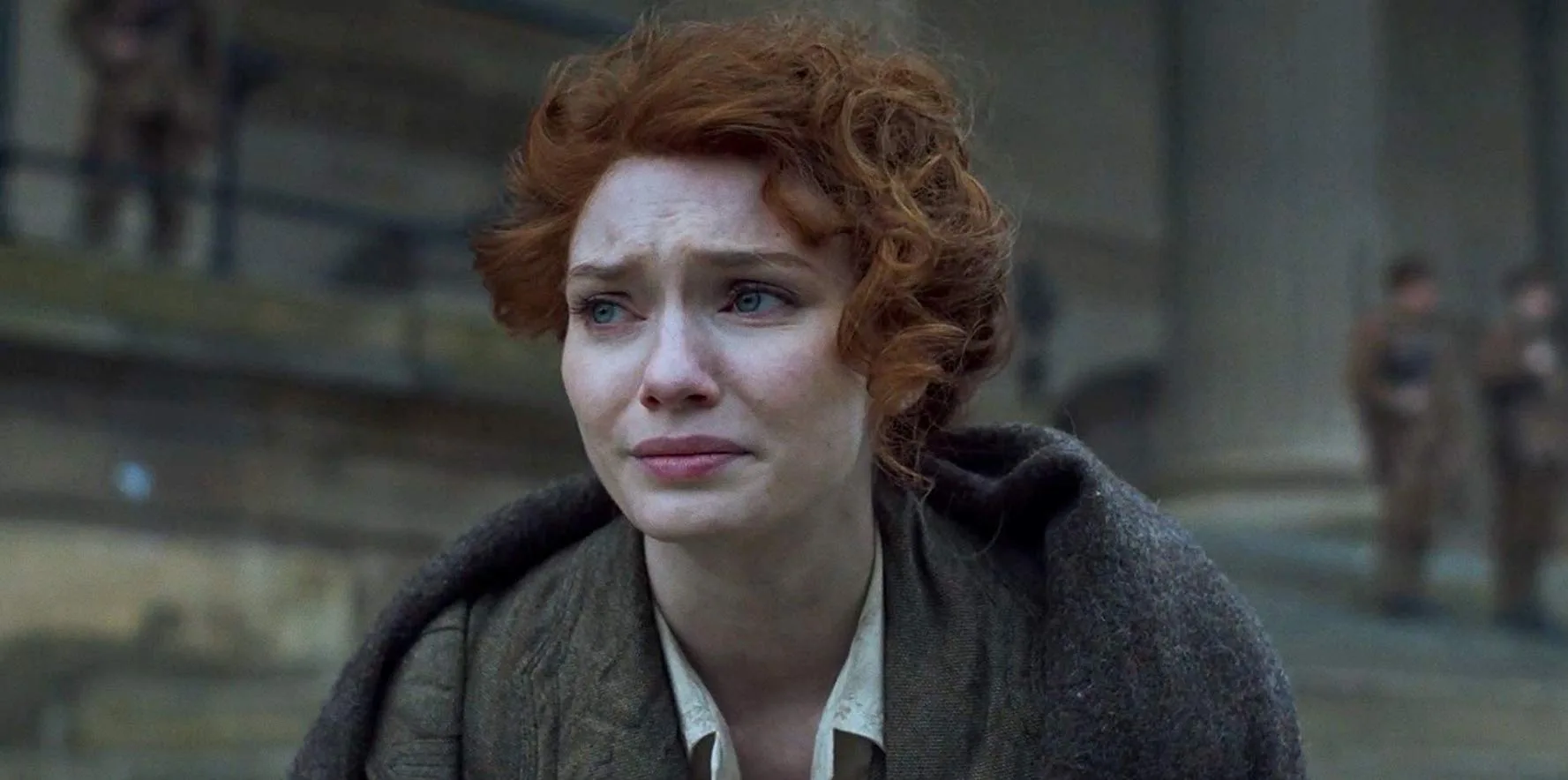
Please note: this is a discussion of the recent BBC version of The War of the Worlds and as such contains spoilers.
Like many other H G Wells fans, I was suitably excited by the promise of a new, televised version of War of the Worlds: taking the action back far closer to the time when Wells actually wrote it, the trailers promised a real spectacle, with evident care taken over how the new version looked, although for reasons unknown the action was moved ever so slightly into the future – taking place in Edwardian, rather than Victorian England. Well, the mantra here has to be – be very careful what you wish for. The costumes might be attractive, the settings (almost) plausibly contemporary, but sadly, as soon as things get underway, the appeal starts and ends there. It seems extraordinary to me that you would go to the trouble of choosing a period setting and a well-known story, and then tinker with the story itself in such a series of ways as to irrevocably alter, and mollify, the original. The changes made are often head-scratching, changing the substance of the Martian threat in ways which beg many questions and undermine many of the story’s key elements. Though, perhaps, the other kinds of alterations are the most irritating, because they come wholly via modern predilections and concerns, and here’s another mantra: familiarity breeds contempt.
There were some moments of real optimism when Robert Carlyle first appeared on-screen as the astronomer Ogilvy, charting developments on the surface of Mars which seemed to show some sort of disturbance at the surface. This chimed very nicely with the opening elements of the novella and its brilliant opening, the concept that, as their resources dwindled, the vastly-superior Martians ‘regarded this earth with envious eyes’, plotting and undertaking an invasion – all whilst man busied himself with his own petty concerns, not given to taking much interest in something usually the preserve of the scientific community. This is something that Wells does brilliantly – he depicts the sullen stupidity and self-absorbed nature of everyday people, right up until the first capsule lands in parkland near his narrator’s home in Woking. No one writes the stupidity of crowds like Wells. No one.
And yet, the part of the story when the capsule first lands, and a monotonous, ominous tapping begins to be heard within it, is omitted from the 2019 version. Rather than taking it slowly, building the suspense on screen which Wells generates in his story, the new screenplay does two things: it plunges the audience instead into a completely unnecessary love story (which, by being extra-marital, allows some hemming and hawing about Edwardian morals whilst adding a brand-new and possibly obligatory female character into the mix) and then, when we’re back to the site of the first landing itself, there’s no slow, awful unscrewing of the canister, no shock reveal of the creatures themselves who, incapacitated by the stronger gravity on the surface of Earth, need to retreat almost immediately – but still generate terror and panic in the watching crowds. Instead, writer Peter Harness and director Craig Viveiros give us the flashy sequence of a levitating sphere and an early attack on the crowds outside the foreign craft. We see nothing of what is going on, only a rather ham-fisted means of flagging the danger! to come.

Having committed itself to a female lead character in the plucky, educated, and of course pregnant Amy (can’t be plucky unless you have a reason to live beyond yourself, right girls?) the screenplay seems to spend an inordinate amount of time preaching the true love which exists between her and her partner George, who has bailed out on his rather prim wife to play cottage with his new girlfriend. Whilst the performances here are… okay, the relationship itself feels exactly what it is throughout: a distraction. By focusing almost continually on whether or not George is 4 Amy 4 Ever, this rendition of War of the Worlds assumes that we will readily sympathise with them both, to the exclusion of the hell which is eventually to be unleashed on society at large. Personally, I found them both lacking in interest, a microcosm which couldn’t quite hold as anarchy was unleashed. In effect, although it’s not the most prominent aspect of the plot in the novella, Wells also gave consideration to a relationship between a man and a woman, but – by separating his narrator from his wife by the extraordinary circumstances overtaking their lives, we are made privy to his range of concerns, fears and motivations rather than simply treated to a tale of boy meets girl at the exclusion of all else. This works well; it is fully-realised and plausible, with a vindication of the narrator’s faith and bravery at the book’s close which hangs together with everything he has witnessed and experienced. What makes the 2019 TV series even more disengaging is that, via adding a new timeframe which takes us regularly forward into a bleak new future, we are presented with Amy again but not George: are we intended to ponder whether they will be reunited, and invest fully in this possibility? It doesn’t work. The shifting moments in time are disorientating, the futurescape itself barely-realised, other than to show that it’s both dysfunctional and particularly unsafe for women. Distraction layers upon distraction here, and with it comes frustration.

Perhaps, had the screenplay focused more on the threat unfolding, it would have had time to show us not just the Martians themselves (who when they rather incredulously decide to scamper around on the ground look like the critters from Starship Troopers) but the eventual appearance of the fighting machines, or ‘tripods’, which cause such a stir when they’re first sighted that they are able to successfully decimate large swathes of England. Whilst the tripod design itself is quite effective, it’s lobbed in very early on and then dominates proceedings, being the only Wellsian visual which seems to survive intact from the book and is as such flaunted, credentials-like, during every remnant episode. Less is more, at least as the horror of the original story begins to build and new vessels continue to land in England, the threat rising incrementally. But then, the series dodges the redemptive moments: the Thunder Child sequence, the sense of (perhaps misplaced) hope that mankind could rebuild, live underground, the loving but understated reunion at the novel’s close. It skips all of this, and shows us that humanity has all but regressed; this, to me, is part of the series’ odd, skittish and simplistic agenda.

Now, before anyone jumps to say that The War of the Worlds is an anti-imperialist novella, I know. I’ve read it. The entire concept for the story came from a conversation which Wells had regarding how the British had brutalised the native Tasmanians during their campaigns to claim that territory: against the might of the British, with their industrialised weaponry and trained troops, the people living there stood no chance to defend themselves. Wells pondered this, and wondered what would happen if a force superior to the British could emerge and do the same to us Brits. However, in creating his story of a Martian invasion of English territory, he steers his reader to see this possibility with a very light touch, not devoting paragraph after paragraph to scold people into seeing the parity. In effect, he largely trusts his readers to have the intelligence to work it out.
The 2019 screenplay not only lacks any faith in audience intelligence, but it communicates its loathing of the British Empire, regularly, via its crude script and so many needless additions which can be rendered down into ‘British Empire bad’. From the minister who looks up at a fighting machine and goes off into a reverie at all the awful things the British could do with it to the ‘ISN’T THAT WHAT WE DO?’ lesson when the subject of Martian destruction comes up, right through to the laughable monologue by Amy at the end which rather bizarrely celebrates the lovely ‘brown skinned people’ she remembers from India, with their nice clothes and sunny weather, the hectoring is absurdly crass. The whole thing is watch-through-hands, embarrassingly bad. It’s barely beyond dog-whistle, deliberately swapping out the key elements which make the original story great whilst redressing the diversity in the cast, elevating fashionable postcolonial ideas but communicating them in unsophisticated, worthy vocabulary which feels like a chiding, skipping the slow build for three episodes where quite simply, some machines harangue an unorthodox romantic couple.
I appreciate that the funding and the approbation these days comes from espousing all the right ideas which never brook any opposition in vast swathes of the media, but come on. Wells’ novel is still popular over a hundred years since it was first serialised because it’s good. It still works. And this was meant to be an adaptation of it. When we read it, we understand the great vulnerability of mankind, its arrogance, the old British certainty that nothing could assail it. However, it also shows us ingenuity, complex ideas, a range of emotional states. It shows us that vulnerability is not just ours alone, and that for all the stupidity of crowds, Wells also believed in its inverse – people’s capacity to go on, to adapt and to keep strong. He also believed that his contemporaries could appreciate nuance and subtlety without missing the point he wished to make. What a shame so few films and TV series afford us the same optimism.
